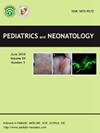关于视频探视对早产儿母亲在大流行期间的抑郁和压力的影响的初步研究
IF 2.3
4区 医学
Q2 PEDIATRICS
引用次数: 0
摘要
本文章由计算机程序翻译,如有差异,请以英文原文为准。
A preliminary study of the effectiveness of video visitation on depression and stress in mothers with preterm infants during the pandemic
Background and purpose
Parents of preterm infants experience anxiety and stress in the neonatal intensive care unit (NICU). Visitation restrictions due to COVID-19 have increased maternal pressure and limited bonding opportunities. Little research exists in Taiwan on using video conferencing as a solution. This study investigates depression and stress levels in mothers of preterm infants and evaluates the effectiveness of video visitation during NICU restrictions.
Methods
This study adopts a cross-sectional design and a qualitative survey. Mothers of premature infants were recruited and they participated in the study. Interventions for video visits were scheduled on the third day of admission to the NICU (T1) and during the second week of the study (T2). After each video visit, participants completed an online survey. The study's online survey used structured questionnaires including demographics, the Edinburgh Postnatal Depression Scale (EPDS) and the Parental Stress Scale (PSS): Infant Hospitalization (IH).
Results
A total of 51 mothers of preterm infants participated in the study. During the T1 and T2 periods, single mothers with lower educational levels and those aged below 30 experienced depression and high levels of stress. Lower birth weight and gestational age were associated with maternal depression. Video visitation intervention led to a significant decrease in depression scores (EPDS, T1: 11.3 ± 5.5 vs. T2: 10.1 ± 5.2, p = 0.039). Positive correlations were observed between EPDS and PSS: IH scores (p < 0 .005).
Conclusion
Video visitation intervention can reduce maternal depression in mothers with preterm infants. Since it is practical, video visitation may be applied even after the pandemic.
求助全文
通过发布文献求助,成功后即可免费获取论文全文。
去求助
来源期刊

Pediatrics and Neonatology
PEDIATRICS-
CiteScore
3.10
自引率
0.00%
发文量
170
审稿时长
48 days
期刊介绍:
Pediatrics and Neonatology is the official peer-reviewed publication of the Taiwan Pediatric Association and The Society of Neonatology ROC, and is indexed in EMBASE and SCOPUS. Articles on clinical and laboratory research in pediatrics and related fields are eligible for consideration.
 求助内容:
求助内容: 应助结果提醒方式:
应助结果提醒方式:


